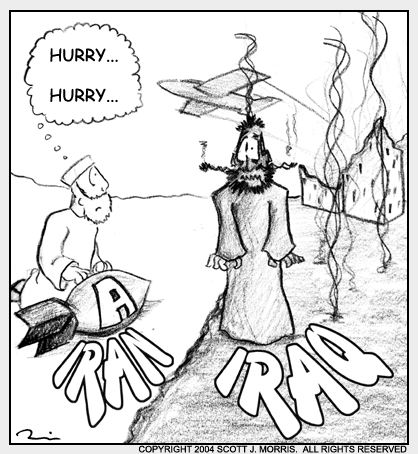To Avoid a U.S. Invasion
Or: How Iran Learned to Stop Worrying and Love the Bomb
Sunday, February 25th, 2007
Reposted from December, 2004.

On November 26 Iran refused to cease uranium enrichment contrary to an agreement reached between Iran and the European Union. According to the New York Times, this supports the Bush Administration’s notion that Iran has secret ambitions to build a nuclear weapon. Actually, this would imply that Iran has overt ambitions to build a nuclear weapon.
Can one blame Iran for nuclear ambition? Considering the protectorate ideology of the cold war, whereas one must have nuclear weapons in order to discourage nuclear attack, Iran’s future as a political entity could depend upon nuclear capability. The argument can, and has, been made that the United States’ threat of military confrontation will provide Iran with incentive to comply with international demands of disarmament. However, Iran’s ambitions have been cultivated by rhetoric from the Bush Administration, notably their inclusion in the “Axis of Evil,” along with Iraq and North Korea. While eventually laughed off in our own country, abroad such language remains a damaging indication of our government’s intentions, as Abu Ghraib remains a festering indication of U.S. behavior at war.
According to George W. Bush in his infamous 2002 State of the Union address, Iran “pursues these weapons” of mass destruction and poses “a grave and growing danger.” Bush also asserted in this speech that Iraq actively “plotted to develop anthrax, and nerve gas, and nuclear weapons for over a decade.” The meaning of this was clear: the administration was more and more adamant for military confrontation with Iraq.
Seeking to avoid an invasion, Iraq submitted itself to apparently very successful inspections, yet Bush would not allow this to avert his war plans. Iraq openly demonstrated no interest in developing weaponry, but was still invaded. The occupation eventually demonstrated the truth, the incompleteness of the Bush administration’s understanding. A U.S. initiated October report found that Iraq ceased all WMD ambitions by 1996.
The second country of the “Axis of Evil,” North Korea, took a different approach. In the months following Bush’s address, it became increasingly clear that North Korea did, indeed, possess a nuclear weapons program and perhaps nuclear weapons. North Korean diplomats did little to discourage this thinking, boasting of bombs before the international community was certain they existed. It now seems certain that North Korea has several atomic weapons. To date, North Korea has yet to be invaded, and all foreign policy directed from the United States has been geared toward diplomacy.
Recent evidence suggests that Iran operates a nuclear weapons program as well. Predictably, the European Union has begun seeking a diplomatic solution, and the United States has referenced the “military option.” However, is this the first talk of the military option regarding Iran? Iran probably interpreted “Axis of Evil” to mean that invasion was already being discussed, and considers atomic weaponry insurance.
It’s really not a surprising, nor illogical, attitude. Given the administration’s apparent contempt for diplomacy, Iran is uncertain whether compromise can be effective. Based upon the rhetoric, they scramble to construct a strategy to avoid an American invasion. Iraq has been invaded, North Korea has not. Iran may have had nuclear ambitions regardless, but accelerated their efforts due to a growing threat from the U.S.
An angry man is standing in a crowded square, and the police are closing in on him. Will he last longer with or without a gun?
The United States has created another arms race, one in which the other side is hopelessly behind. Worse, the opposition is forbidden to compete by international law. While the U.S. agenda of disarmament and terrorist containment was often hailed as noble in the flood of international sympathy after September 11, the U.S. has squandered its credibility invading Iraq. Accusations of dangerous weaponry will never carry the same weight, and will fall on deaf ears. Instead of peaceful disarmament, U.S. foreign policy has provoked accused states
to work towards armed defense.
